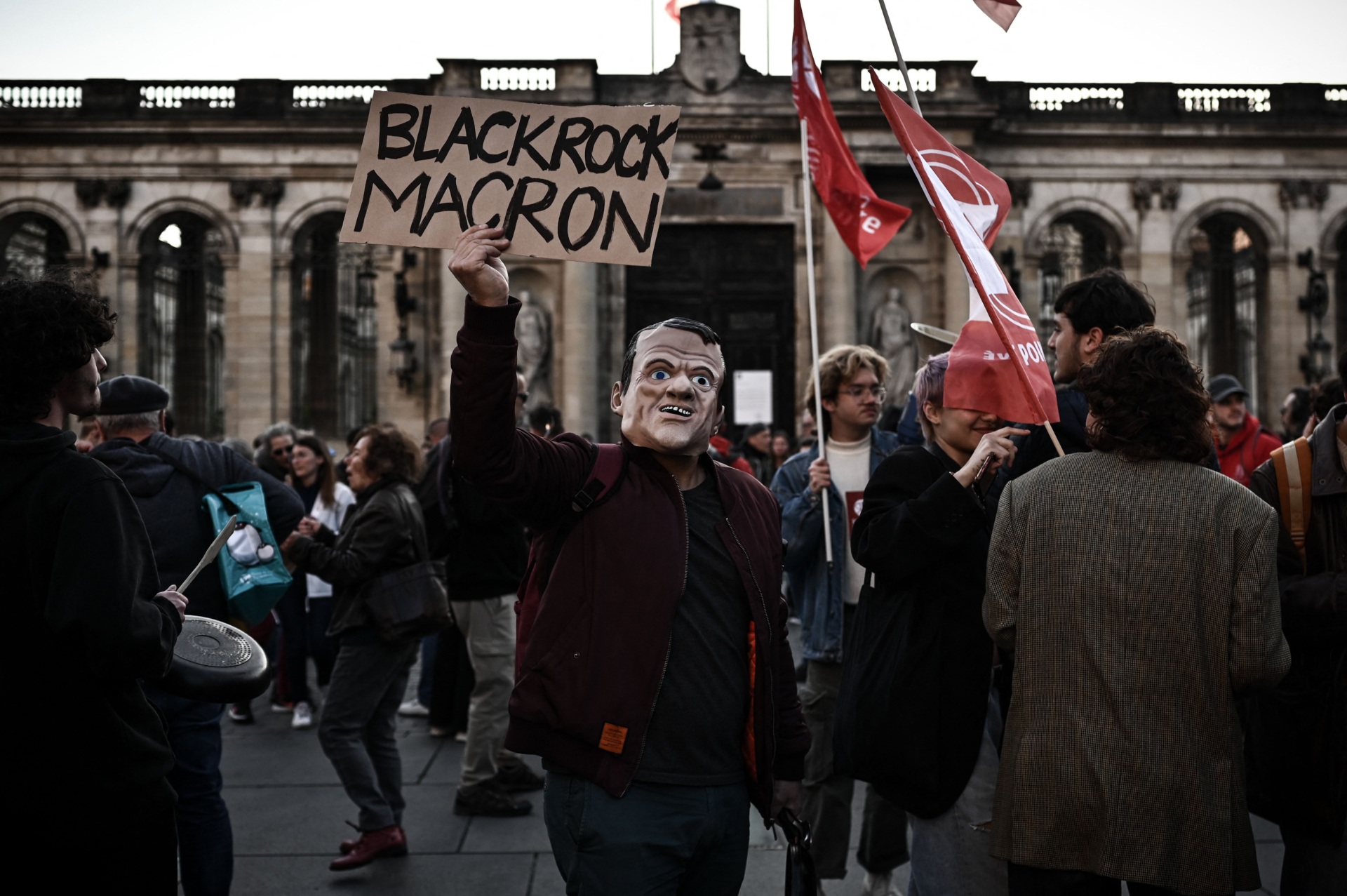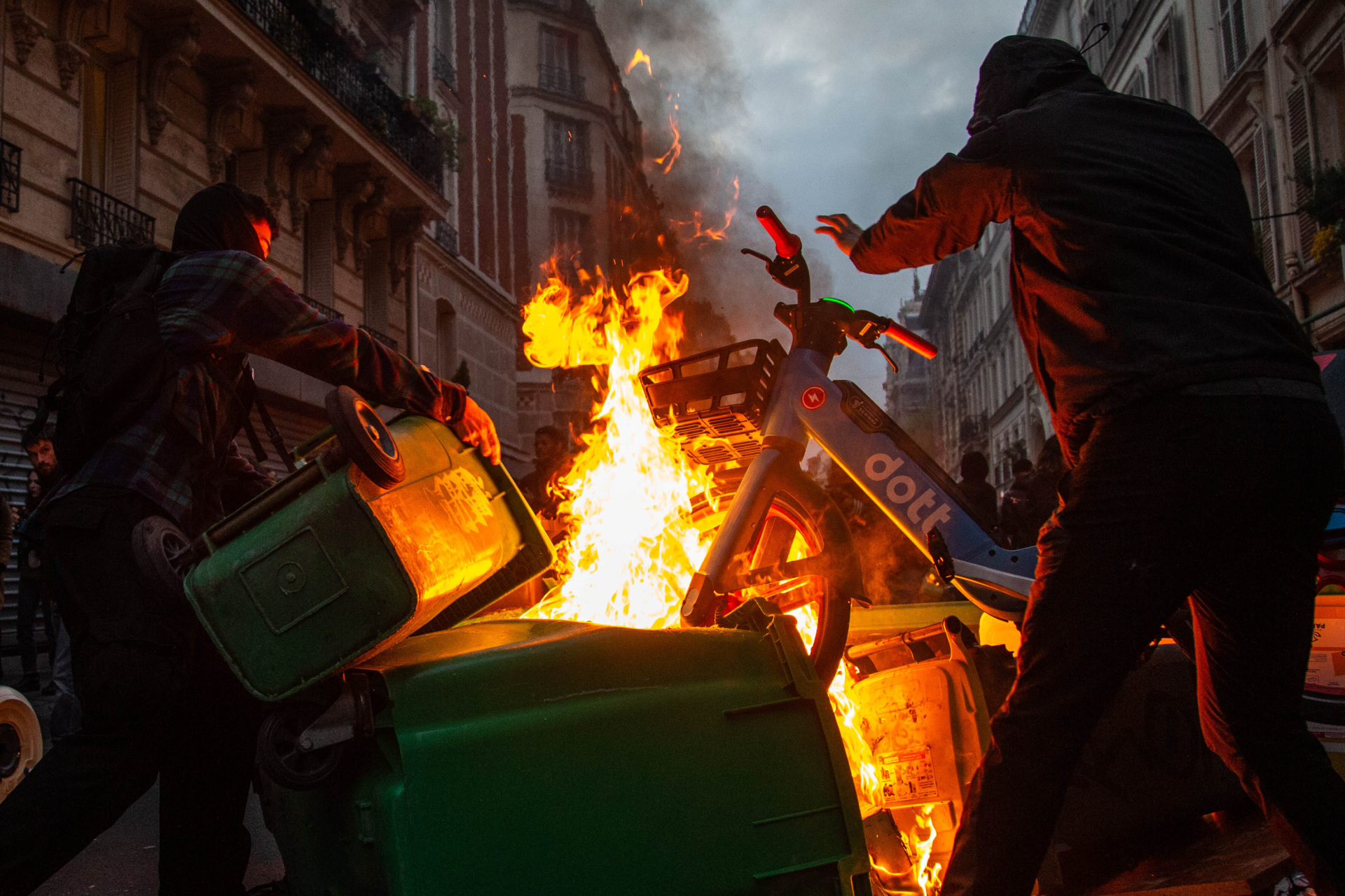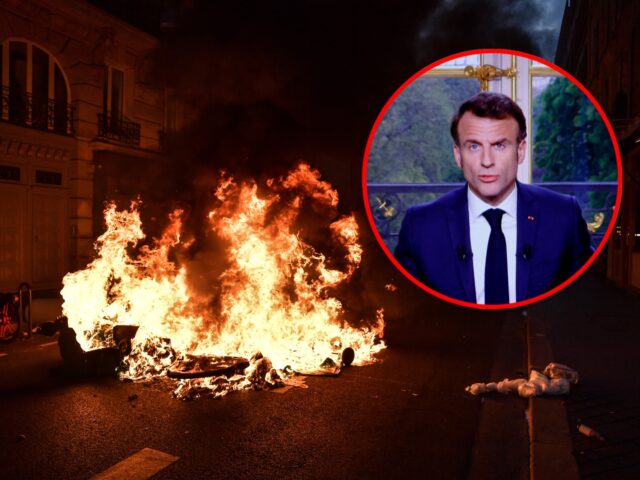In an address to the nation on Monday evening, French President Emmanuel Macron begged for 100 days to get his government out of the crisis that has plagued his fifth year in office, however, opposition leaders and the public do not appear ready to relent on the pressure on the Élysée Palace.
With the backdrop of fiery protests in Paris and Bordeaux, President Macron in his first comments since signing his controversial pension reforms last week asked the nation to give his government 100 days to implement an action plan to address the myriad of grievances held among the French people.
Acknowledging the widespread opposition to his move to raise the retirement age from 62 to 64 years old without a vote, which has contributed to widespread protests and riots over the past month, Mr Macron admitted in a national address that “a consensus has not been found”, adding: “Is this an accepted reform? Obviously, no.”
Mr Macron went on to appear to admit the failures of his globalist governance style, which has seen the working class largely left behind and him personally branded as the “president of the rich”, with protesters often tying the agenda of the former Rothschild banker to the aims of global financial firms such as BlackRock.

A demonstrator wearing a mask of French President Emmanuel Macron, takes part in a concert of pans to protest during president’s televised address to the nation. (Photo by Philippe LOPEZ / AFP) (Photo by PHILIPPE LOPEZ/AFP via Getty Images)
The president said in comments reported by Le Figaro that there is “anger at a job that, for many French people, no longer allows you to live well, in the face of prices that rise… from the shopping, from the canteen… Finally, anger because some feel they are doing their part, but without being rewarded for their efforts, neither in aid nor in effective public services.”
Laying out three “major projects” — seemingly aimed at differing factions that have united against his government — Macron first promised to open up negotiations with the trade unions that have been the backbone of the street protests and strikes since last autumn over the cost of living wage increases amid soaring inflation.
Macron said that his government would seek to not only negotiate on salary hikes but also on bettering working conditions in what he called a “pact of life at work”, as well as the retraining and employment of older workers.
Secondly, in a scrap of red meat to rural communities — the home of the base of support for right-wing populist and former presidential candidate Marine Le Pen — Macron vowed to create new brigades of gendarmerie to step up policing the countryside and to step up enforcement on illegal immigration while stepping up efforts to integrate legal immigrants into French culture and society.
Finally, the embattled French president said that he would seek to “find concrete solutions to improve daily life” such as improving state education and health systems and promising to “decongest” all emergency services by the end of 2024.
In order to accomplish these goals within the 100-day time frame, Macron will need to find “new coalitions and alliances” given that his Ensemble! group in the parliament lost its majority last year. The uphill battle of “expanding the majority” has been handed down to Prime Minister Élisabeth Borne, who invoked the constitutional loophole to pass through Macron’s pension reforms without a vote last month.
It remains to be seen where such bridge building will be possible. Once, the place to look was the centre-right Les Républicains, yet this may not be such an easy task, with the vice-president of the party, Julien Aubert, questioning the legitimacy of Macron’s continued rule over the weekend.
Aubert called for the president to put his pension reforms to the public in a popular referendum, saying: “Without popular legitimacy, that is, without the confidence of the people, the President of the Republic cannot play any role.”
Following the national address on Monday, Républicains leader Eric Ciotti said that the policy proposals — though light on detail — were “commendable”, but said that he would be approaching them with a heavy dose of “scepticism”.

PARIS, FRANCE – APRIL 17: A protester burning a bike after people gathered in front of the city hall of Paris 10 as the French president Emmanuel Macron gives a presidential speech. (Photo by Ibrahim Ezzat/Anadolu Agency via Getty Images)
The speech received less favourable words from the populists on the left and the right, with Marine Le Pen characterising it as an example of a “disconnected, solitary and obtuse practice of power”. Meanwhile, far-left leader Jean-Luc Mélenchon blasted the address as being “completely out of touch with reality”.
It also seems doubtful that the street demonstrations across the country will subside anytime soon, with activists and unions vowing to continue their firey protests until Macron backs down.
Concerningly for the president, despite the chaos on the streets and disruption to necessary public services, the French public continues to back the protests against his government by a margin of 64 to 35 per cent in favour.
At the very least, it is likely that protests and riots will continue until May 1st, International Workers Day, which even under normal political circumstances typically devolves into chaos in Paris.
Follow Kurt Zindulka on Twitter here @KurtZindulka

COMMENTS
Please let us know if you're having issues with commenting.